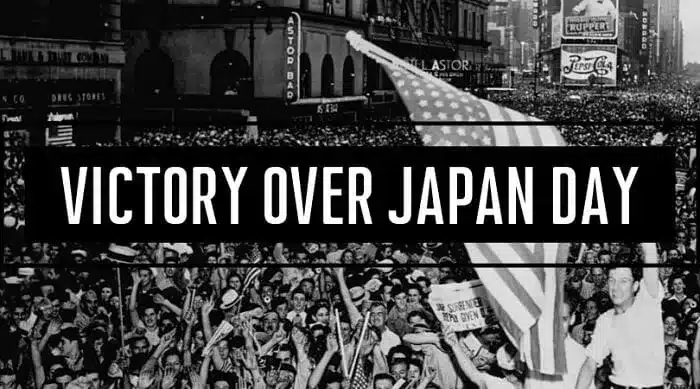Victory over Japan Day

Victory over Japan Day (also known as V-J Day, Victory in the Pacific Day, or V-P Day) is the day on which Imperial Japan surrendered in World War II, in effect bringing the war to an end. It would officially be celebrated in the United States on the day formal surrender documents were signed aboard the USS Missouri in Tokyo Bay: 2 September 1945. But as welcome as victory over Japan was, the day was bittersweet considering the war’s destructiveness. The term has been applied to both days on which the initial announcement of Japan’s surrender was made – 15 August 1945, in Japan, and because of time zone differences, 14 August 1945 (when it was announced in the United States and the rest of the Americas and Eastern Pacific Islands) – as well as to 2 September 1945, when the surrender document was signed, officially ending World War II.
On 15 August is the official V-J Day for the United Kingdom, while the official US commemoration is 2 September. The name, V-J Day, had been selected by the Allies after they named V-E Day for the victory in Europe.
On 2 September 1945, formal surrender occurred aboard the battleship USS Missouri in Tokyo Bay. In Japan, 15 August usually is known as the “Memorial Day for the end of the war” the official name for the day, however, is “the day for mourning of war dead and praying for peace”. This official name was adopted in 1982 by an ordinance issued by the Japanese government.
Reaction to Japanese Surrender
In Washington on 14 August, President Harry S. Truman announced news of Japan’s surrender in a press conference at the White House: “This is the day we have been waiting for since Pearl Harbor. This is the day when Fascism finally dies, as we always knew it would.” Jubilant Americans declared 14 August “Victory over Japan Day,” or “V-J Day.” (8 May 1945–when the Allies accepted Nazi Germany’s official surrender–had previously been dubbed “Victory in Europe Day,” or “V-E Day.”)
V-J Day over the Years
Many V-J Day celebrations fell out of favor over the years due to concerns about their being offensive to Japan, now one of America’s closest allies, and to Japanese Americans, as well as ambivalent feelings toward the nuclear devastation of Hiroshima and Nagasaki.
In 1995, the 50th anniversary of the end of World War II, the administration of President Bill Clinton referred not to V-J Day but to the “End of the Pacific War” in its official remembrance ceremonies. The decision sparked complaints that Clinton was being overly deferential to Japan and that the euphemism displayed insensitivity to U.S. veterans who as prisoners of war suffered greatly at the hands of Japanese forces.
Observer Voice is the one stop site for National, International news, Sports, Editor’s Choice, Art/culture contents, Quotes and much more. We also cover historical contents. Historical contents includes World History, Indian History, and what happened today. The website also covers Entertainment across the India and World.

